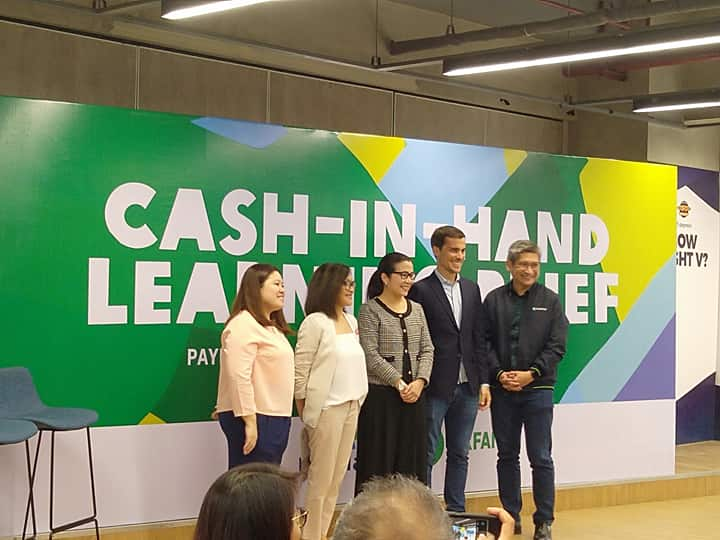It’s no secret that many Filipinos, especially those living in far-flung areas in the provinces, are living below the poverty line. This is often worsened by the need to take on toxic personal debts, usually from loan sharks, which perpetuates a crazy cycle of poverty and ever-increasing debts.
One of the biggest reasons for this is financial illiteracy and inability to access basic financial products and services. Lack of knowledge prevents many Filipinos from managing their finances well while lack of access to the financial system forces them to settle for usurious debts from loan sharks.

Since 2008, Oxfam Pilipinas has been helping marginalized Filipinos, in Mindanao first then in other provinces. Their extensive humanitarian efforts in the country gave them the opportunity to see the plight of many marginalized Filipinos, especially in disaster-stricken areas in provinces like Tacloban and Marawi.
What they saw compelled them to go beyond humanitarian effort and start developmental work as well. More than just providing fish, they started working on teaching marginalized Filipinos to “fish”, so to speak. Thus, the iAFFORD Program was born.
The iAFFORD program (Inclusive and Affordable Financial Facilities for Resilient and Developed Filipinos) is a two-tiered financial inclusion program.
Its main components are:
· Digital Financial Literacy; and
· An electronic cash transfer facility called the iAFFORD-PayMaya card.
Oxfam Pilipinas collaborated with Angat Pilipinas for the digital financial literacy part of the program. Angat Pilipinas developed the financial literacy modules and produced the animated explainer video for the iAFFORD-PayMaya card.
For the electronic cash transfer facility, Oxfam Pilipinas’ partner was PayMaya and Visa, International. They conducted a pilot test of the cash transfer program starting 2016 in key areas like Tacloban and Eastern Visayas. Oxfam and PayMaya documented the entire pilot test and last 5 March 2020, they shared the important things they learned about how electronic cash transfer facilities can help marginalized Filipinos access high-quality and affordable digital financial services. The event was called CASH-IN-HAND LEARNING BRIEF and was held at the headquarters of PayMaya in Mandaluyong City.
The following is the official press release for the event, which provides more details of the results of the iAFFORD digital financial inclusion program:
MEDIA RELEASE
March 5, 2020
Electronic cash transfer programs help unbanked Filipinos beat poverty
The use of digital financial services platforms for humanitarian cash transfers plays a key role in the early recovery of Filipinos affected by disasters by giving them access to financial services and helping jumpstart local markets.
This was among the findings in the study called “Cash in Hand”, which was launched by international development organization Oxfam Pilipinas, together with digital financial services leader PayMaya.
The study, which is based on experience in responding to emergencies in Mindanao and typhoon-affected parts of the Philippines, showed that inclusive and efficient financial services improve people’s welfare, hasten the delivery of social benefits, spur economic activity, reduce transaction costs, and incentivize innovations in both the private and humanitarian sectors.
Financial inclusion is similarly correlated with the reduction of economic inequality by providing means for poor people to overcome barriers to access to financial services, which arise from their lack of information, collateral, and credit history.
In this regard, digital financial products such as the PayMaya e-wallet and card, in conjunction with on-ground, grassroots access through its nationwide Smart Padala agent network, provide the much-needed pathways for timely and efficient disbursement of financial aid, and the eventual use of funds for recovery after the crisis.
“Our experience and ongoing research on cash programming has shown us that using digital financial services platforms for cash assistance helps stimulate local economies. This becomes an entry point for financial inclusion because the poor and unbanked can use financial products to manage risks, grow savings, and access credit to diversify their livelihood opportunities,” Oxfam Pilipinas Country Director Lot Felizco said.
“Access to digital financial services like PayMaya can help make lives better for Filipinos. Our partnership with Oxfam is a clear testament to how we can empower the most vulnerable sectors of society through innovation. This is at the heart of what we do at PayMaya and we will continue to support similar initiatives,” said Shailesh Baidwan, President of PayMaya.
Data from the 2017 Financial Inclusion Survey of the Bangko Sentral ng Pilipinas showed that almost seven out of ten Filipino adults are still considered financially excluded, having no formal access to financial services like savings, micro-insurance, micro-credit, payments, and remittance.
A Bangko Sentral ng Pilipinas 2017 report also noted that almost one-third of the total number of municipalities and cities in the Philippines have no bank or automated teller machine. Only 44 of the 143 municipalities in Eastern Visayas have banks. It is even worse in the Bangsamoro Autonomous Region in Muslim Mindanao (BARMM), where only ten municipalities out of 118 have at least one bank.Eastern Visayas and BARMM are Oxfam’s priority areas for humanitarian and development programming. From 2016 to 2018, Oxfam and its partners reached about 42,000 individuals through the IAFFORD (Inclusive and Affordable Financial Facilities for Resilient and Developed Filipinos)Project.
The project also provided 11,538 people, a majority of whom are women, access to digital and conventional financial products for life and livelihood assets protection.
Through this initiative, Oxfam and its partners hope to strengthen collaborative efforts amongst development agencies, the government, and the private sector, and further contribute to efforts to reduce poverty and vulnerability.
Oxfam is a global non-profit organization that works in more than 90 countries, including the Philippines, to address the underlying problems of poverty and inequality.
###
Contact:
Nick Wilwayco | Head of Public Affairs and Communications | PayMaya Philippines | Email: nick.wilwayco@paymaya.com
April Abello-Bulanadi | Senior Officer for Media and Digital Influencing | Oxfam in the Philippines
Mobile: +639062822562 | Email: abulanadi@oxfam.org.uk